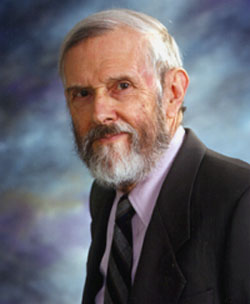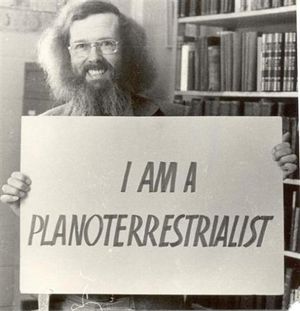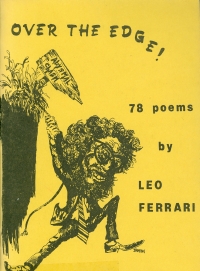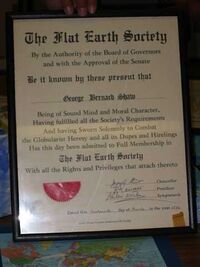Difference between revisions of "Leo Ferrari"
Tom Bishop (talk | contribs) |
Tom Bishop (talk | contribs) |
||
| Line 54: | Line 54: | ||
According to the University of New Brunswick Leo Ferrari was an internationally recognized authority on Augustine of Hippo, publishing over 35 works on the 5th-century bishop-philosopher. Ferrari presented academic papers on Augustine at conferences and conventions and delivered the Saint Augustine Lecture at Villanova University in 1982. In 1991 Ferrari was a published co-author of a substantial work called ''Concordantia in libros XIII confessionum S. Aurelii Augustini'', the first published concordance to the Skutella text. Ferrari retired from teaching in 1995, and in 1998 he was named the first professor emeritus of St. Thomas University. | According to the University of New Brunswick Leo Ferrari was an internationally recognized authority on Augustine of Hippo, publishing over 35 works on the 5th-century bishop-philosopher. Ferrari presented academic papers on Augustine at conferences and conventions and delivered the Saint Augustine Lecture at Villanova University in 1982. In 1991 Ferrari was a published co-author of a substantial work called ''Concordantia in libros XIII confessionum S. Aurelii Augustini'', the first published concordance to the Skutella text. Ferrari retired from teaching in 1995, and in 1998 he was named the first professor emeritus of St. Thomas University. | ||
| − | Of interest, and in relation to the satire vs. serious debate, there is evidence that Leo Ferrari intermingled his scholarly work with his Flat Earth work. In 1996 he published a paper titled | + | Of interest, and in relation to the satire vs. serious debate, there is evidence that Leo Ferrari intermingled his scholarly work with his Flat Earth work. In 1996 he published a paper titled ''Augustine’s Cosmography'', in which he declared that Saint Augustine was a flat-earther. |
https://www.pdcnet.org/augstudies/content/augstudies_1996_0027_0002_0129_0180 | https://www.pdcnet.org/augstudies/content/augstudies_1996_0027_0002_0129_0180 | ||
Revision as of 16:31, 27 November 2022
Dr. Leo Charles Ferrari (8th December 1927 - 7th October 2010[1]), a professor in Philosophy at St. Thomas University[2], was a co-founder, president, and active member of the satirical group known as the Flat Earth Society of Canada[2][3]. Ferarri founded his Flat Earth Society in Fredericton, New Brunswick in November, 1970.
Ferrari and Flat Earth
Dr. Ferrari took a very post-modern approach to the Flat Earth Theory, proposing to overturn the authority of scientists and instead rely on one's own perception of the Earth's shape. He argued that no authority can deterministically claim what is and isn't true, and hoped to restore the sense of validity of personal inquiry and perception. This was largely in response to "science's insistence on the things unseen". Ferrari worried that society was being blinded by science and technology, and that they had lost touch with their own bodies and rational conclusions.
His promotional brochure, subtitled "We're on the level", stated the following postulates[4]:
- We believe in terra firma, and the more firmer the less terror.
- All science, like all philosophy and all religion is ultimately metaphorical and... reality is essentially mystical and poetical.
- Our aim is to restore man's faith in Common Sense... Seeing is believing. ...Man has been blinded by metaphysics, brainwashed by popular fallacies and bullied into denying the evidence of his very own eyes!
Leo also wrote poetry, a lot of which had to do with the Flat Earth.
Historical Overview
A PhD dissertation by David Eso (bio) titled Serious play: Alden Nowlan, Leo Ferrari, Gwendolyn MacEwen, and their Flat Earth Society provides historical research and an overview of Leo Ferarri's Flat Earth Society. One of the key lines of inquiry in the research was whether it was a serious or satirical organization. The author concludes that it was a mix of the two. The dissertation author goes to lengths to argue that the points Dr. Ferrari was making had a serious basis, and should be merited as scholarly works that contributed to his work as a philosopher. The humor may have distracted from this, and his contributions have remained unsung.
In the dissertation David Ero remarks:
- “ Despite its aberrant and oppositional spirit, FES appeared within an identifiable cultural context and participated in a countercultural tradition that continues to this day. The Society’s surface lampoon embeds potent social critique and creative meaning. In other words, FES was not merely playful, nor merely serious, but interweaved these modes in a compelling way; the Society looks by turns intelligent and unintelligible, stupid and sophisticated. Further, it invited contributions from members and applicants: seldom-seen interpretations of “Planoterrestrialism” by individuals from many walks of life and now housed in archives at the University of New Brunswick and University of Calgary. The participatory, humorous, and poetic nature of FES means that its unusual brand of Flat Earthism cannot be tied to any singular ideology, place, or literary tradition. It operates as an enigmatic, errant, itinerant, and underground non-ideology. Planoterrestrial thought is reflected in the playful poetic styles of Nowlan, Ferrari, and MacEwen: three Society members who were nonetheless serious authors and sincere in their role as cultural workers, their Flat Earth antics not excepted. ”
It should be noted that Flat Earth's advocates were not always serious, and have used humor as a tool to add character. The 2007 FAQ from theflatearthsociety.org originally had some satirical content ("Q. What's underneath the Earth? A. This is unknown. Some believe it to be just rocks, others believe the Earth rests on the back of four elephants and a turtle."), which was updated and erased over time. The tfes.org Flat Earth Society also employs elements of humor in its store posters. Samuel Shelton and Charles K. Johnson likewise appear to have had some satirical content in their Flat Earth Societies as well (Flat Earth Membership Cards, "Galileo was a liar" Flat Earth News headlines).
Membership Certificate
Leo Ferrari issued Flat Earth Society membership certificates to those who would join his society. He also issued posthumous membership certificates to George Bernard Shaw and Yuri Gagarin, which are currently held at the University of New Brunswick (Archive).
The text of the certificate reads as follows:
| The Flat Earth Society
By the Authority of the Board of Governors Be it known on by these present that _______________________________ Being of Sound Mind and Moral Character, The Flat Earth Society With all the Rights and Privileges that attach thereto |
Professional Work
According to the University of New Brunswick Leo Ferrari was an internationally recognized authority on Augustine of Hippo, publishing over 35 works on the 5th-century bishop-philosopher. Ferrari presented academic papers on Augustine at conferences and conventions and delivered the Saint Augustine Lecture at Villanova University in 1982. In 1991 Ferrari was a published co-author of a substantial work called Concordantia in libros XIII confessionum S. Aurelii Augustini, the first published concordance to the Skutella text. Ferrari retired from teaching in 1995, and in 1998 he was named the first professor emeritus of St. Thomas University.
Of interest, and in relation to the satire vs. serious debate, there is evidence that Leo Ferrari intermingled his scholarly work with his Flat Earth work. In 1996 he published a paper titled Augustine’s Cosmography, in which he declared that Saint Augustine was a flat-earther.
https://www.pdcnet.org/augstudies/content/augstudies_1996_0027_0002_0129_0180
- “This study breaks new ground in abstracting from Augustine's spiritual symbiology and in attempting to assemble his picture of the physical world as he saw it. Surprisingly, he believed that the two greatest bodies in the universe were the sky and the earth, with the former dome-shaped and covering the latter. The earth was essentially flat and surrounded by the mighty oceanus. The sun and moon were the two greatest bodies in the sky, but each was much smaller than the earth.”
External links

References
- ↑ Leo Charles Ferrari - obituary
- ↑ Jump up to: 2.0 2.1 Leo Charles Ferrari at The New Brunswick Literary Encyclopedia
- ↑ UNB Archives-Leo C. Ferrari Fonds-Introduction
- ↑ The Flat Earth by Donald E. Simanek



